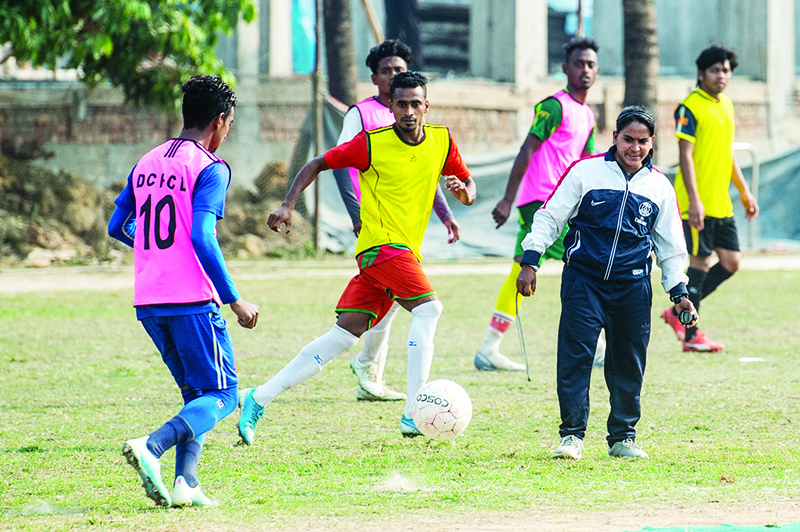
DHAKA: Not many Bangladeshis would quit a safe, public-sector job with perks and a pension to become a full-time football coach, especially not a woman in the deeply conservative nation. But Mirona, Bangladesh’s first female coach at club level, has done just that. And the 27-year-old, who comes from a humble background, has no regrets.
“I have always dreamt of being coach of a top team and one day even the national side,” said Mirona, who stands barely five feet (1.5 metres) tall. The former Bangladesh international was speaking as she coached a group of male players — all much taller than her — on the outskirts of Dhaka.
Mirona was an assistant coach at Dhaka City Football Club, a second-tier team, last year when Bangladesh Navy invited her to coach its women’s team. For most people in Bangladesh — especially the lower middle-class — this was like winning the lottery: a safe job with retirement benefits that many people can only dream of.
But a few months later, Mirona got a call from her former club, which is owned by a garment entrepreneur. She was offered the head coach’s position with full freedom — from recruiting players to preparing the team — to fight for its promotion to the premier league.
Mirona, who grew up in a village among six siblings, did not think twice and she quit the Navy immediately, despite consternation from her senior military colleagues. Dhaka City’s administrative manager Robin Ahsan, also a former national player, said the club made the right decision in hiring Mirona. “Our team’s performance has improved since she joined us. Her honesty and hard-working attitude are tremendous,” said Ahsan.
“She can mingle with players better than many male coaches in this industry.” Mirona said she is having the time of her life, despite some barbs directed at her by male coaches. “At first many people negatively commented about me being in this profession. Many male coaches couldn’t take that, a woman becoming a club head coach,” she said. “I believe in quality. If I have it then I know I can prove that I can train up the players,” she said.
Her parents and most of her siblings, who still live in rural Bagerhat district, some 250 kilometres (155 miles) south of the capital Dhaka, want her to settle down and get married. But Mirona says she is “married to football” and that for now the sport “is my life and my family”. She says she has largely avoided criticism from the community, adding that her parents’ support played a big role when she started out as a footballer more than a decade ago. Mirona was a midfielder for the national side for eight years, and also played club football in the Maldives.
“There was no family pressure when I took up soccer. Besides, I love the sport so much that I overcome all the barriers,” Mirona said. Mirona’s return to Dhaka City electrified the training ground. “We love being in her training sessions. We can feel our improvement day by day. She made us believe in fitness,” said midfielder Ataur Rahman. “She made me play in the midfield when I was a winger. But now I understand midfield strategy, thanks to her, very well,” the 19-year-old said.
The club was so impressed that it signed two more female coaches, one for goalkeeping and one as an assistant, said team manager Ahsan. For now, Mirona’s main focus is the battle for the title in the second-tier championship league, which usually starts in June but has been delayed due to the worsening coronavirus situation. She has now gone back to her village where she spends much of her time watching matches of Barcelona and her favourite player, Lionel Messi. “He is technically so gifted. He is a superstar, yet so gentle. My ultimate goal is to watch him play a match at Camp Nou,” she said. –— AFP

